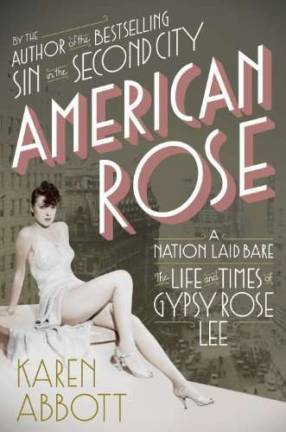Book Review: American Rose

Considering how obsessed biographer Karen Abbott (Sin in the Second City) is with Gypsy Rose Lee's flair of emphasizing the tease in striptease, it should be no surprise that Gypsy's secrets remain at least half-buried, despite the 300-plus pages of Abbott's strenuously titledAmerican Rose: A Nation Laid Bare: The Life and Times of Gypsy Rose Lee.An inveterate self-mythologizer, Gypsy achieved the ultimate in rewriting her past when Arthur Laurents wrote the book to what is possibly the greatest Broadway musical ever created, aptly titledGypsy. Gone were the sleazy, desperate days that Abbott mostly just alludes to; instead, Gypsy takes a backseat to her monstrous mother, Rose Hovick, a woman who, if anything, is even more destructive than Laurents' portrayal of her. Involved in at least two possible homicides (which Gypsy's memoir and the musical have almost completely erased from the public memory), Rose was the stage mother to make Joan Crawford look like Mary Poppins.
But while Abbott has a flair for the down and dirty America of the early 20th century, she doesn't reveal much in the way of personal archaeology. Even interviews with Gypsy's younger sister, June Havoc, and her son Erik Preminger, haven't revealed anything more substantial than what a quick glance at Gypsy's Wikipedia page would reveal. There are some heavy hints regarding Gypsy's possible involvement in bestiality, but they're never turned into anything more concrete.
Gypsy, it turns out, was as adept at keeping her personal life secret as she was at taunting audiences by hesitating to reveal herself in total nakedness. And Abbott seems to have contented herself with writing a fast-paced, pulpy book that wallows in the era without going too deep. Her chapters on the Minksy Brothers and their burlesque empire are fascinating, but feel like padding in a book that promises to be the first, dirt-spilling in-depth look at America's favorite stripper, one who seems to return to Broadway with every full moon.
Like Gypsy herself, however, Abbott makes a page-turner out of very little (although her cracked chronology often leaves us panting to continue the story, while Abbott leaps back or forward in time to discuss something else). This Gypsy is a silent presence, revealed mostly through others' reactions to her. That may make for a mesmerizing, memorable woman, but in a biography, it's a definite disappointment. Still, there's something austerely admirable in a woman who so successfully managed to take to the grave most of her secrets, and she's revealed in her full, exterior glamour inAmerican Rose, a watchful, semi-smiling presence who puts to shame all the fame-hungry idiots of reality television with her carefully manufactured persona. To paraphrase the final line ofAmerican Rose, Gypsy is still giving what she has to, and keeping all she can.